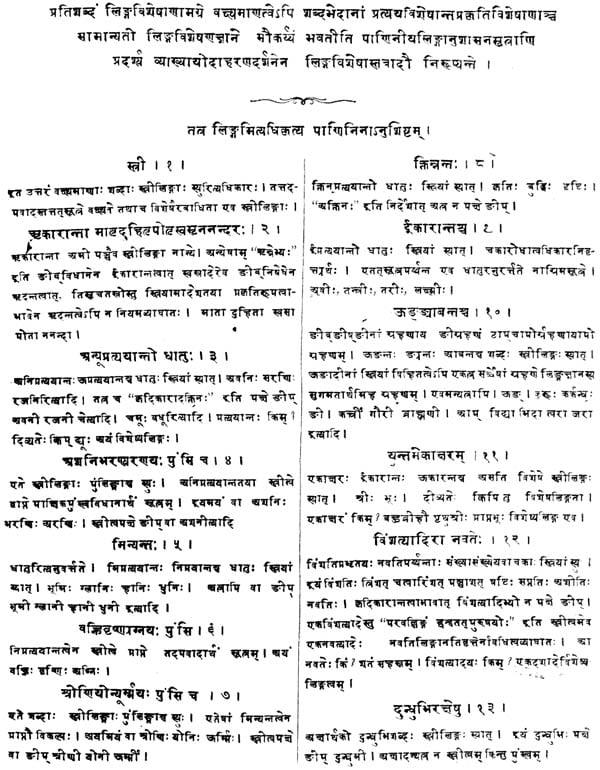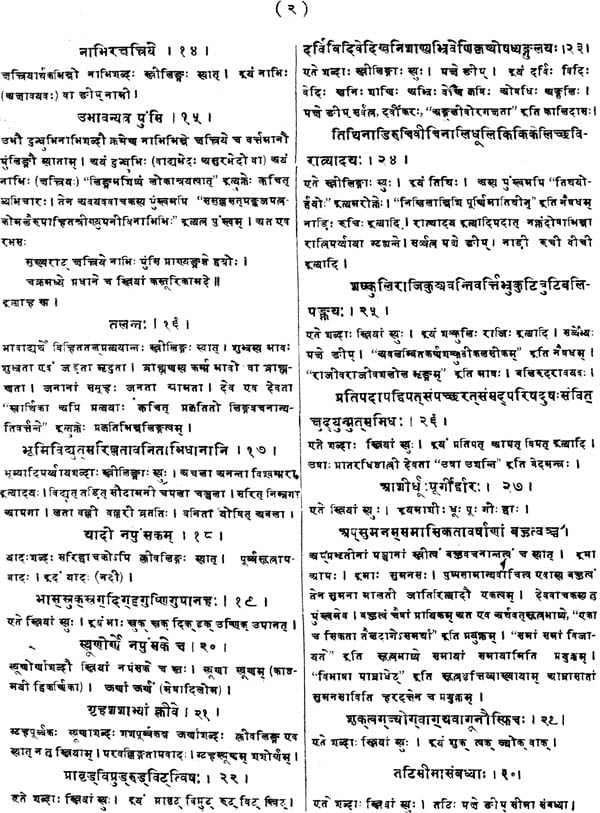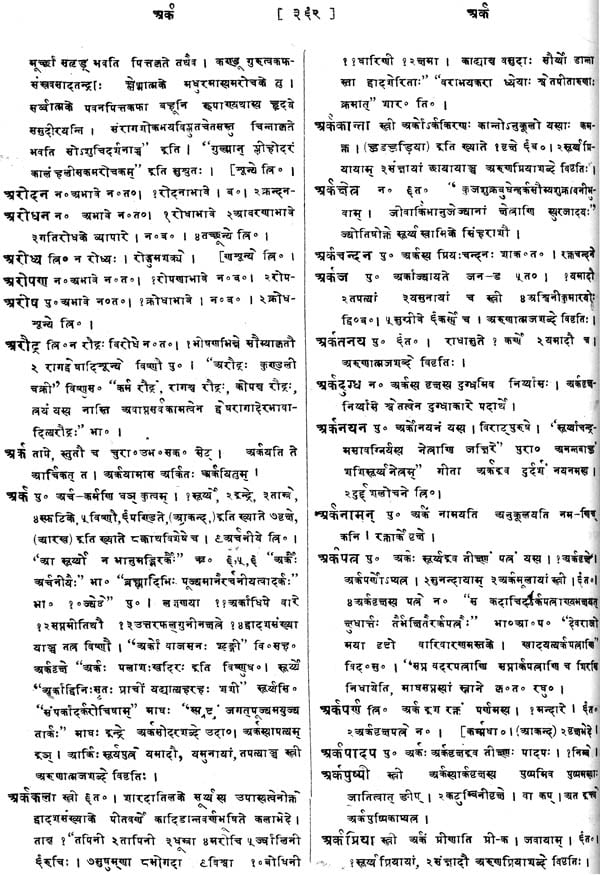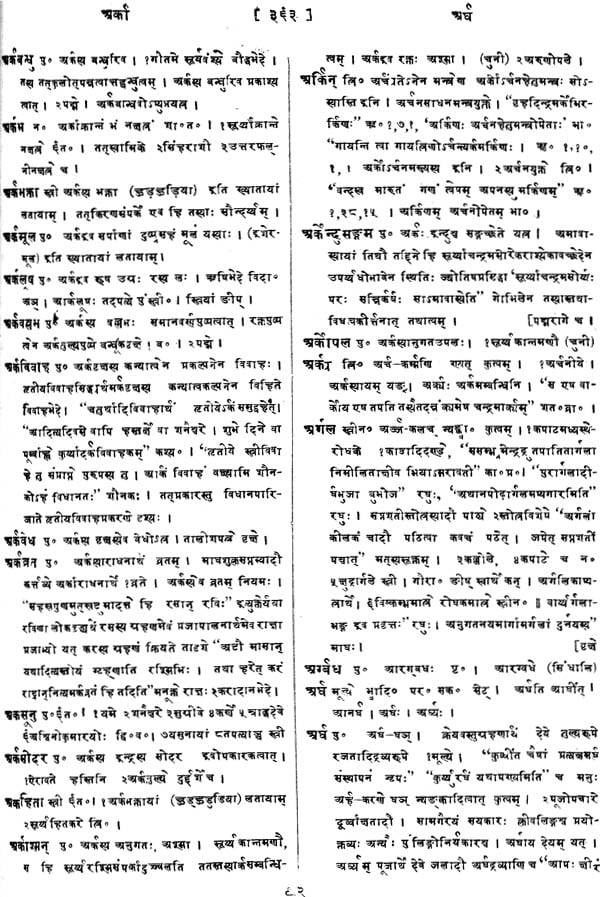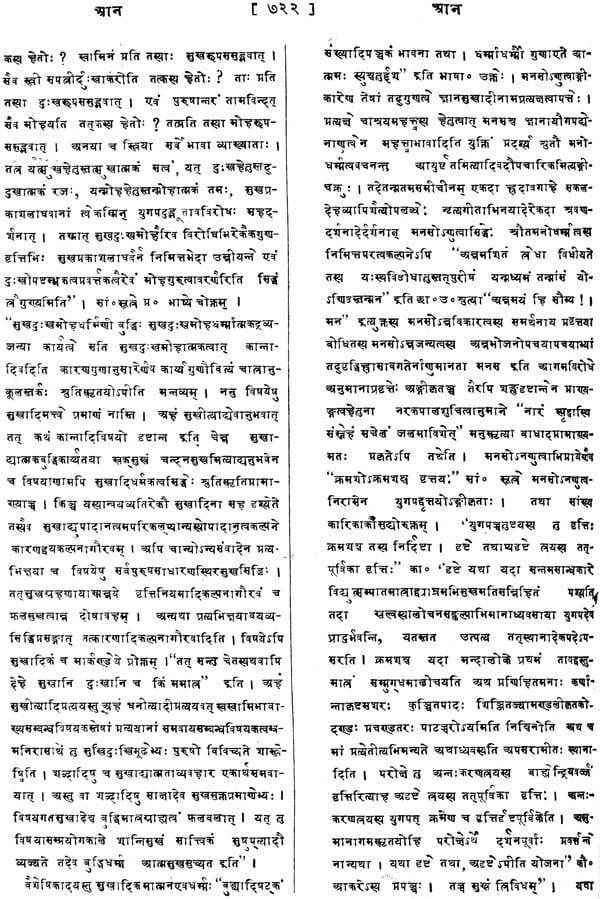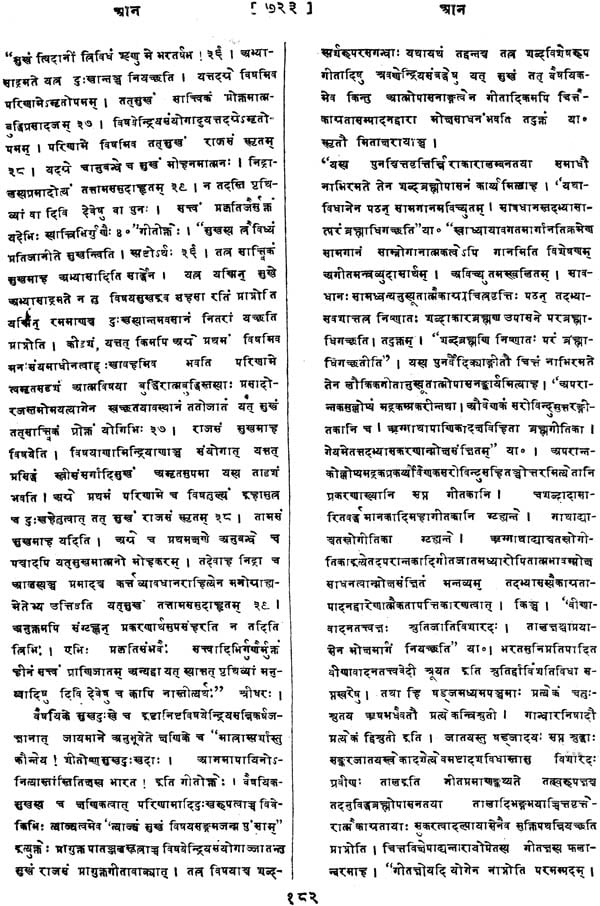
Vacaspatyam (A Comprehensive Sanskrit Dictionary) (Sanskrit Only In Six Volumes)
Book Specification
| Item Code: | IDC287 |
| Author: | Sri Taranatha Tarkavachaspati |
| Publisher: | Rashtriya Sanskrit Sansthan, Janakpuri |
| Language: | sanskrit |
| Edition: | 2018 |
| Pages: | 5442 |
| Cover: | Hardcover |
| Other Details | 11.4" X 8.8" |
| Weight | 12.78 kg |
Book Description
Publisher’s Note
This encyclopaedic Sanskrit Lexicon is a pioneer work in its field, and ever since its publication has been held in the highest esteem not only in India but even in England and Europe. Its author, Pandit Taranatha Tarkavachaspati, with his great erudition and indefatigable industry, devoted several years in collecting the materials for it, which is by far, wider and deeper in scope than any other contemporary Sanskrit Dictionary. It contains terms along with their derivations and explanations, drawn from almost all the branches of Sanskrit Literature, such as Vedas, Vedangas, Puranas, Upapuranas, Philosophy, Tantra, Politics, Rhetoric, Prosody, Musi al Science, Military Science, Cookery, Shiksha, Kalpa, Science of Horses, Hatha-Yoga, and Vastushastra, etc. Besides, the technical words and doctrines of the following systems of Philosophy are fully explained: Charvaka, Madhyamika, Yogachara, Vaibhashika, Soutrantika, Arhata, Ramanuja, Madhva, Pashupata, Shaiva, Pratyabhijna, Raseshwara, Panini, Nyaya, Vaisheshika, Mimansa, Samkhya, Patanjali-Yoga and Vedanta.
The author of the work himself claims that, in addition to all the derivations and different meanings with illustrations of all the words which are found in Wilson’s Sanskrit Dictionary and Raja Radhakanta’s Shabdakalpadrum, it contains numerous words not to be found in these or any other precious Dictionary. It also contains numerous Vedic words which are not to be found even in the Bohtlingk’s St. Petersburg Sanskrit-German Dictionary.
It was tragic indeed that such an important and useful work remained out-of-print for such a long time. We are, therefore, just as we have done in case of Shabda-kalpadrum, reprinting it with selfless motive so as to make it once more available to the readers. However, it is evident that such a huge venture cannot be successful without the patronage of Institution and Scholars. We therefore earnestly hope to get it from everyone.
Preface
The profound learning and indefatigable industry of Pandit Taranath Tarkavachaspati, one of the professors of the Calcutta Sanskrit College, has been well known to all in India interested in the classical language of the Hindus and has extended to England and Germany, where his numerous works command a wide circulation among Sanskrit Scholars.
His edition of Panini’s grammar with his own commentary was published in 1863 with the patronage of the Government of Bengal on the recommendation of Mr. E. B. Cowell M.A. at that time Principal of the Calcutta Sanskrit College and now professor of Sanskrit in the University of Cambridge.
Pandit Taranath has been for many years collecting materials for a Sanskrit Dictionary, which shall have a wider and deeper scope than Wilson’s Sanskrit Dictionary and the Sabdakalpadruma by the late Raja Radha kanta Deva. It will moreover contain explanations of terms in the Tantras, Philosophy, Rhetoric and Law which are not fully given in the published portions of Bohtlingk’s Dictionary. These Dictionaries are written respectively in English, in Sanskrit with Bengali characters and in German. The Pandit’s Dictionary will have the explanations in Sanskrit, so as to be available for the use of both Hindu and European Scholars.
When I had the honor to officiate in 1865 as Director of Public Instruction, I brought to the notice of Sir Cecil Beadon the Lieutenant Governor of Bengal, the desire of Pandit Taranath to publish such a Dictionary, and His Honor in consideration of the acknowledged fitness of the learned Pandit for the preparation of the work, was pleased to accord to it the patronage of the Government of Bengal in the following letter, from the Junior Secretary of the Bengal Government to the Director of Public Instruction No. 507 dated Fort William the 26th January 1866.
“I am directed to acknowledge the receipt of your office letter N. 2 dated the 3rd instant and in reply to convey the Lieutenant Governor’s sanction to the purchase of 200 copies at Rupees 50 per copy aggregating Rupees 50 per copy aggregating Rupees 10,000, of the Sanskrit Dictionary in its complete form which Pandit Tarkavachaspati the Grammar Professor of the Sanskrit College engages to compile within a period not exceeding five years.”
“No sum whatever, I am to add, will be paid unless the work is completed.” An extension of time for five years longer was granted for the preparation of the work by Sir William Gray, the Lieutenant Governor of Bengal, in the letter from the Bengal Government No. 3480 dated the 12th December 1870.
| 1 | Panini on genders |
| 2 | On the suffixes |
| 3 | On the primitive and derivative words |
| 4 | The derivation and different meanings with illustrations of all the words which are found in the Wilson’s Sanskrit dictionary and Radhakanta’s Sabdakalpadruma. Also numerous words not to be found in the said or any previous Dictionaries |
| 5 | The derivation and different meanings of the words of the Vedas |
| 6 | Numerous Vaidik words not to be found in Bohtlingk’s Sanskrit and German Dictionary |
| Technical words and doctrines of the following systems of Philosophy are fully explained | |
| Charvaka, Madhyamika, Yogachar, Vaibhashika, Soutrantika, Arhata, Ramanuja, Madhva, Pashupata, Saiva, Pratyavijna, Rasheswara, Panini, Nyaya, Vaisheshika, Mimansha, Sankhya, Patanjala, and Vedanta | |
| 7 | The technical terms of the Shrauta and Grihya sutra |
| 8 | The technical words of Hindu law |
| 9 | The plan and scope of all the Purans and Upapuranas |
| 10 | Plan and scope of the Mahavarat and Ramayana |
| 11 | The History of the ancient kings of India as far as gathered from the Purans and Upapurans |
| 12 | The position and description of the different countries according to Hindu ancient Geography |
| 13 | The technical terms of Hindu medical science are fully explained; also an account of Hindu anatomy and the preparation of the drugs. |
| 14 | The explanations of the technical terms of Hindu astronomy. Also the theory of the celebrated Hindu astronomers regarding the celestial regions |
| 15 | The principles of Hindu astrology |
| 16 | The technical words of the Tantras, Politics, Rhetoric, Prosody, Musical science, Military science on Horses, Hatyoga, Vastushastra |
| 17 | Classification of the Vedas |
